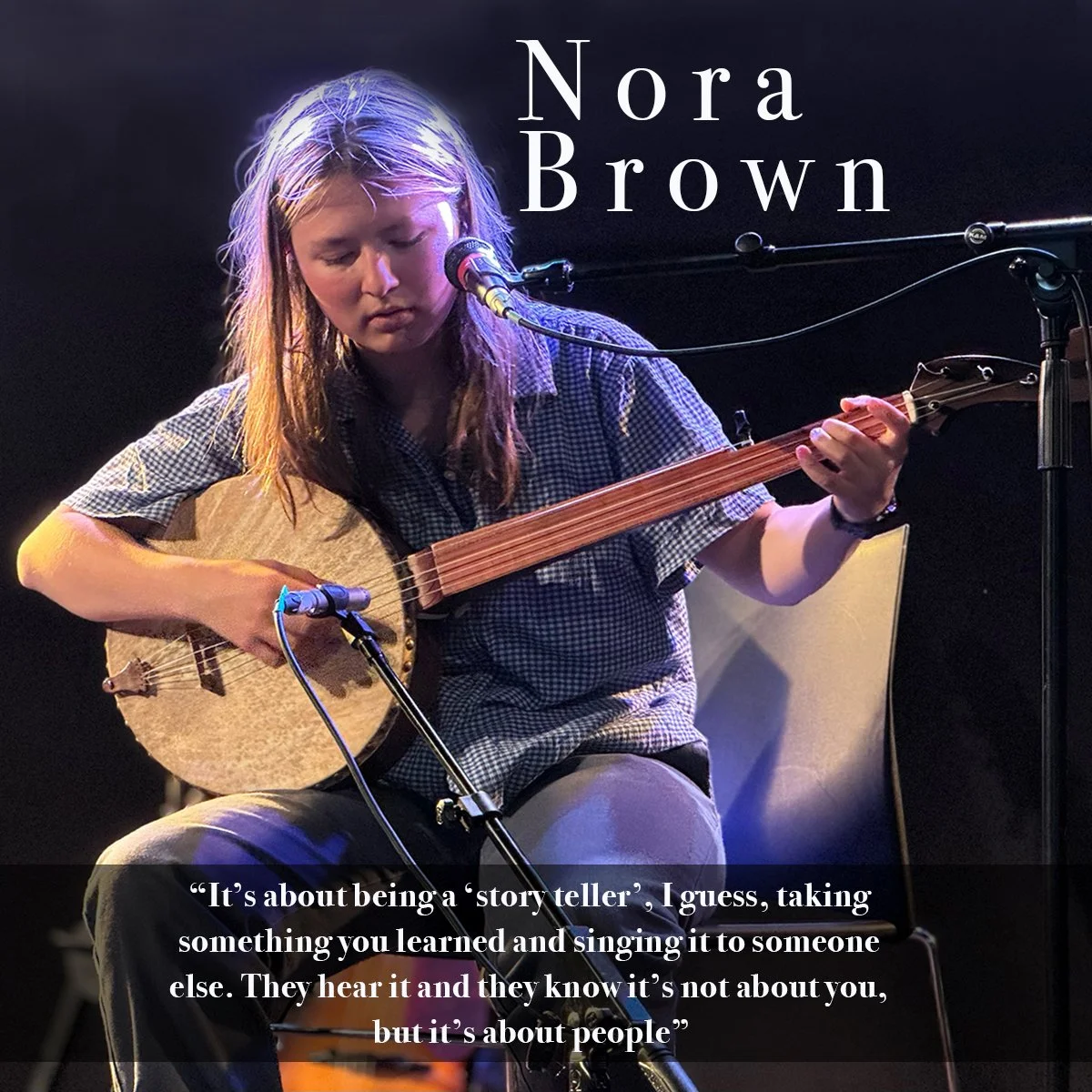Still only eighteen years old, Nora Brown is something of a sensation in the American traditional music world, where she is steeped in the folk music of the Southern Appalachians. She has released three full length albums, CINNAMON TREE (2019), SIDETRACK MY ENGINE (2021) and LONG TIME TO BE GONE (2022), as well as her recent EP (with old time fiddle player Stephanie Coleman), LADY OF THE LAKE. Currently touring England with Stephanie Coleman, you still have a chance to catch one of those gigs, or at Cambridge Folk Festival in July. We caught up with the New Yorker before her sold out gig in the Duncairn, Belfast and gained some insight into what makes her tick.
Nora Brown was taken by her parents to ukulele lessons with veteran teacher Shlomo Pestcoe in Brooklyn, where they live, when she was just six years old. She quickly progressed to other stringed instruments, so that by the time she was ten, she had fixed on the open back banjo, played clawhammer or frailing style, as her instrument of choice.
So how did it work out that she became immersed in the music of Eastern Kentucky and Tennessee just a few short years later?
Nora Brown: I started going to festivals there and competitions like at Clifftop Festival and I was introduced to people like Lee Sexton and George Gibson. They are really welcoming people in that tight music community.
She also got to know the late John Cohen (musician, musicologist and collector of folk music) and the legendary folk singer Alice Gerrard (now 89), who produced Nora’s first album when she was just 13 years old.
NB: Alice is a super cool lady who is still really energetic, like certain people in that world who never lose their excitement about the music, learning about it and documenting it. It was nice to have her guidance at that point, when I wasn’t sure about my own opinions.
Nora also credits the Jalopy Theatre & School of Music in Brooklyn as being an influence and being important in promoting old time music in NYC. They have also issued all of her albums on their Jalopy Records label.
Nora’s voice is striking in its depth and her ability to convey emotion. Is her vocal technique purely down to luck or has she had singing lessons?
NB: I attended a NY public high school which specialises in music and I majored in vocals, so I had regular singing lessons there.
How do you make these songs your own and make them sound like you have lived them?
NB: It’s about being a ‘story teller’, I guess, taking something you learned and singing it to someone else. They hear it and they know it’s not about you, but it’s about people, and you get to help those people’s stories live on by talking about them.
I wondered how does she choose which songs to cover, what draws her to particular songs?
NB: Usually melodies are what draw me in, less often the words. There are definitely songs that I wouldn’t do, I suppose, if I feel that they are too specific to a certain identity, like songs from the perspective of an enslaved person, or a miner, for example.
Dirk Powell recently declared (in a song) that he won’t sing the likes of Pretty Polly and other femicidal murder ballads any more. What does Nora feel about this stance and what is her own position on these traditional but misogynous folk songs, which seem to glory in the killing of girls and women?
Stephanie Coleman: (who sat in for the interview) I don’t feel the need to stop playing those sort of tunes, although there are certain fiddle tunes that I just don’t play anymore if they have really unacceptable titles. I have more problems with the current culture of the music, with the lack of women playing festivals, some of them have 95% men on the bill.
NB: I agree with you on that and we don’t want to make anyone feel uncomfortable, but I guess it feels more potent or relevant to invest our energy in creating more female participation.
SC: It’s also more problematic for (someone like) Dirk to sing Pretty Polly than for two women to perform it - we are reclaiming the story and thinking about her memory.
This is your first tour of Ireland. Do you have any Irish connections?
NB: Yes, my maternal great-grandparents came from Donegal! They were from Glencolmcille - mainly Boyles and McGills. My family have joined me on this tour and we plan to visit our relatives there this week.
And have you listened to any Irish music?
NB: Stephanie has introduced me to the music of Andy Irvine & Paul Brady and I listen to lots of Irish music now. We actually spotted Andy Irvine at Baltimore Fiddle Fair (which the duo played the previous week).
Any plans to study music more formally? What are you studying in Yale, where you have already completed your first year?
NB: I’ve been doing a bunch of introductory courses - I haven’t decided yet what I’m going to focus on, but I’m not really interested in going down the Berklee route of formal study of music theory etc, right now anyway.
You have already collaborated with Jerron ‘Blindboy’ Paxton (USA), Kris Drever (Scotland) and Eli West (USA). Are there any plans for future collaborations?
NB: I play out with two NY based Irish musicians regularly - Eamonn O’Leary (The Murphy Beds) and Jackson Lynch - when I’m at home. Otherwise, Stephanie and I plan to record a duo album next, although we’re just in the early stages of planning that.
We’ll certainly be keeping a close eye on what this talented young woman does next.
Interview and photo by Eilís Boland

